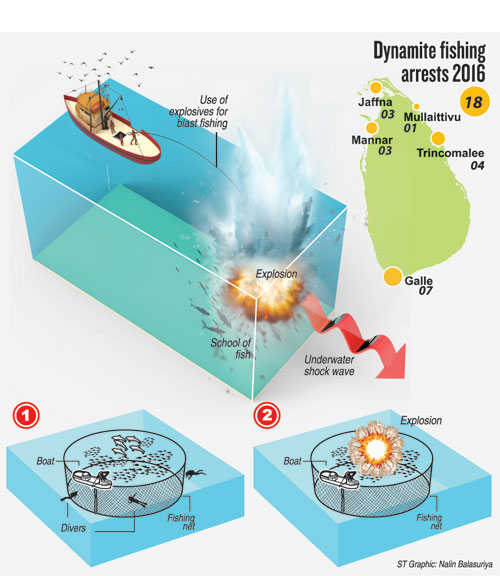News
Snap raids on markets to stop dynamite fishing

A big catch: Victim of dynamite fishing. (file pic)
Islandwide raids are underway in major fishmarkets to identify catches harvestedthrough dynamite explosions, following an initial raid at Peliyagoda.
“We are planning to conduct similar raids in other markets also as we have received information that significant amounts of fish caught using dynamite are coming into markets. It was also brought to our notice that those fish catches are not good for human consumption,” Fisheries Department Director-General M.C.L. Fernando said.
A tip-off earlier this month resulted in a raid at the Peliyagoda fishmarket to nab agents who supply fish caught using dynamite.
Fisheries Minister Mahinda Amaraweera has directed the Navy to arrest fishermen who engage in such practices, Mr. Fernando said.
Along with Fisheries Department officials, National Aquatic Resources Research and Development Agency (NARA) officials and Special Task Force (STF) took part in the raid at Peliyagoda, in which four people were arrested, two for allegedly catching fish using dynamite – police found them in possession of their catch – and two for selling lobsters caught using dynamite explosions.
All four suspects were produced before the Wattala Magistrate Court last week and the two were fined Rs 25,000 each after confessing to catching lobsters without permits. Other two suspects were released on personal bond pending analysis of their catch to verify that the fish were killed with dynamite.
Dynamite was used to obtain a huge catch, Dr. Rekha Maldeniya, former research head at NARA and a marine fish expert, said.
Fishermen identify a fish school in deep seas with the help of Global Positioning System (GPS) and send down divers to herd the fish into a small area. Then dynamite is thrown into the sea. Following the explosion, thousands of stunned or dead fish float to the top of the water, easy pickings for the fishermen.
“The amount of dynamite used in fishing is determined by the size of fish school and a variety of nets are used to handle different fish. Ring nets are used for large fish types,” Ms Maldeniya said while explaining that limited labour resources had also led to increased usage of dynamite.
She said the use of dynamite disrupted the marine environment, destroying coral reefs, sea vegetation and marine life. The practice has caused massive calamity to rich marine resources.
Health experts warn that fish caught by dynamite fishing are not suitable for human consumption as the fish are in explosives-contaminated water for some time.
When Ms Maldeniya was head of NARA’s Marine Research Department, guidelines were formulated to differentiate fish caught using dynamite and other fishing methods. Injured gills and reddish eyeballs would indicate fish were caught with explosives as the blast would damage almost all its internal organs. Another technique is to cut open the stomach of the fish to check for internal bleeding.
As such fish generally have internal and external injuries, fish caught with dynamite cannot be stored for more than a day or two.
Dynamite fishing is prohibited under the Fisheries and Aquatic Resource Act No 2 of 1996 due to the destruction caused to ocean ecological resources. Two amendments to the Act have brought in increased penalties.
The Fisheries Ministry said fishermen using dynamite could be fined not less than Rs 100,000 and up to five years imprisonment. Those who are caught with possession of fish caught with dynamite would be liable for a Rs. 50,000 fine and a year’s imprisonment.
This year alone, the ministry has filed 18 cases in magistrates courts and prosecuted 42 people for engaging in dynamite fishing. Most of the culprits were from Trincomalee, Galle, Mannar and Mullaitivu.

